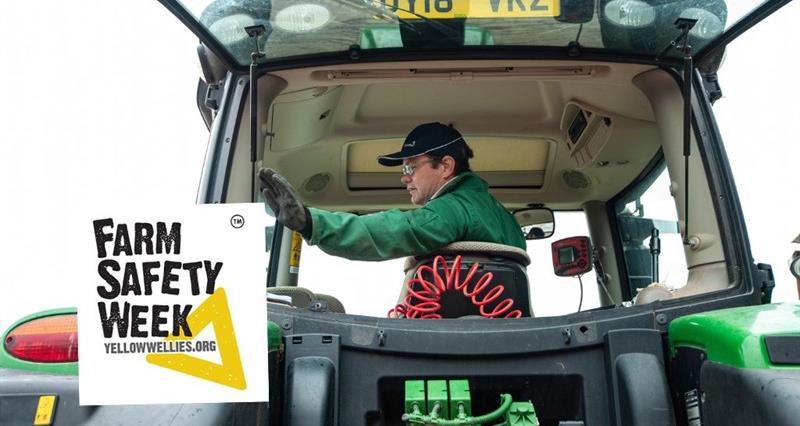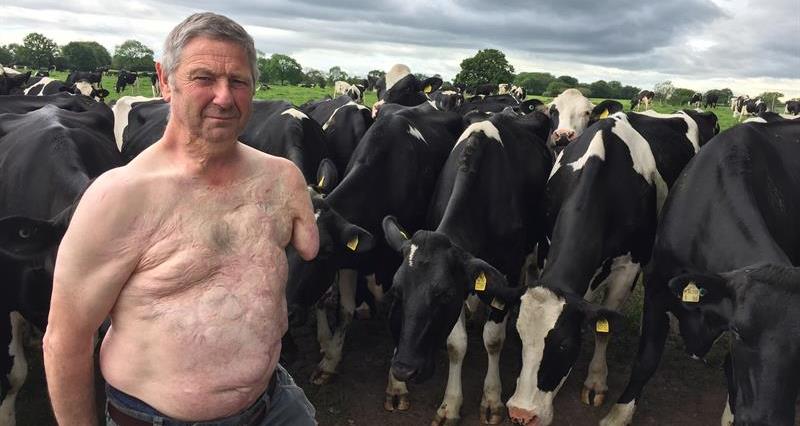“Every number is not just a statistic – it is a personal tragedy” – that was the message from NFU Deputy President and Farm Safety Partnership chair David Exwood after updated figures for fatal accidents in British agriculture were released.
They showed that 27 people lost their lives in the year to March 2024 in England, Wales and Scotland.
Agriculture continues to have the worst rate of fatal injuries across the main industrial sectors, some 21 times higher than the all-industries average.
The second most dangerous profession was construction, with a rate five times the average.
The release of the figures also marks the start of Farm Safety Week – a campaign managed and funded by the Farm Safety Foundation (Yellow Wellies). The 2024 campaign will focus on the importance of recognising and recording near-misses.
Putting safety first
Despite accounting for only 1% of the working population, agriculture accounts for 20% of all deaths in the workplace.
Nearly 40% of farm workers killed were over the age of 65.
Four members of the public were killed, two of which were children.
NFU Deputy President David Exwood said the report was "disheartening to see".
“Our sector must work on improving the culture of farm safety. You are 21 times more likely to have a fatal accident working in agriculture than any other industry and frustratingly the risks and necessary precautions are well known and understood.
“This is about putting safety first in simple, cost-effective ways that will mean everyone goes home at the end of the working day.”
NFU Deputy President David Exwood
“This isn’t about time or money. Nothing costs more than a serious accident or death in a business, and the effect on what are often family members can be devastating. This is about putting safety first in simple, cost-effective ways that will mean everyone goes home at the end of the working day.”
Addressing attitudes and behaviours
The Farm Safety Foundation has said the industry needs to address the attitude to risk-taking and poor safety behaviours, adding that “we cannot let this continue”.
This year marks ten years of the Farm Safety Foundation and while the charity says it is proud of what has been achieved so far, today’s figures highlight “there is so much more to be done to address the risks and dangers farm workers face every day to put food on our plates”.
Stephanie Berkeley, Farm Safety Foundation manager said: “Attitudes and behaviours around farm safety are changing but the pace of change is slow – too slow for the families of those we have lost in the industry and too slow for the thousands of farmers suffering every day with long term ill-health or serious injuries as a result of their work.”
She said this week offers an opportunity for a “real reset” to how farm safety and risk-taking is approached.
Head of Agriculture at the HSE Sue Thompson said the number of fatalities within agriculture has remained “stubbornly high”.
“All too often, the industry fails to properly manage health and safety risk in the workplace, resulting in serious and fatal injuries that could, and should, have been prevented. That children continue to be killed on Britain’s farms is a source of tragedy and sadness and is totally unacceptable.”
She said real change would require “a significant shift in culture” adding that the regulatory body will continue to work with its agricultural partners.
Scottish farmer and NFU Mutual chair Jim McLaren MBE said: “Farm Safety Week is a great opportunity for our whole sector to pause and reflect, to remind ourselves that virtually every task we undertake on farm has the ability to kill or seriously injure us if we approach it in the wrong way or with undue haste, carelessness or bravado.”
Farm Safety Week
For Farm Safety Week last year, the NFU launched a campaign to encourage people in the industry to share and promote good practices using the universal theme of ‘Take 5 to Stay Alive’ and #NFUThinkSafe.
The NFU works with other organisations representing a broad spectrum of agricultural interests as part of the Farm Safety Partnership. NFU Deputy President David Exwood is the current chair.
The NFU also sits on AIC working groups and the AIAC board, as well as working with the HSE to improve the understanding of stress and mental wellbeing in the industry and how it can be improved.
Understanding the stats
It is important to note, that under HSE, agriculture encompasses the forestry and aquaculture industries.
The HSE has reported 27 fatalities for the recording year 1 April 2023 to 31 March 2024. Of those, 23 were because of agriculture, the remaining four were as a result of forestry and fishing activities.
Causes of fatalities can be broken down in the following way.
- 9 relating to transport, including operating agricultural vehicles or machinery, runover incidents, rollover incidents and crush incidents.
- 3 relating to livestock, including 1 member of the public.
- 2 relating to machinery, including entanglement in machinery and PTO shafts.
- 5 relating to being struck by an object, including falling bales and collapsing objects.
- 2 relating to falls from height, including fragile roofs and using a telehandler.
- 2 relating to contact with overhead power lines.
Over the year 2023-24 HSE released 32 fatal injury notifications, where it was believed activities for the agricultural industry were taking place.
HSE reviews each notification to determine if they are as a result of agriculture and those that are not are removed, giving the final figure for the recording year of 23. While the nine notifications that were not deemed to be as a result of activities for the agricultural industry are removed from the final figure, it is still important to review the circumstances of these fatalities, as they are often circumstances that would be found within agriculture and lessons can be learned from them.
View the full breakdown at: HSE.GOV.UK | Fatal statistics.



